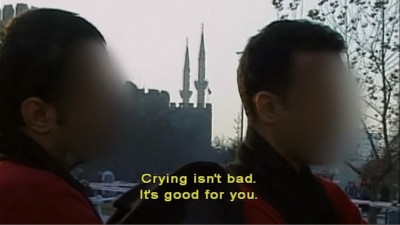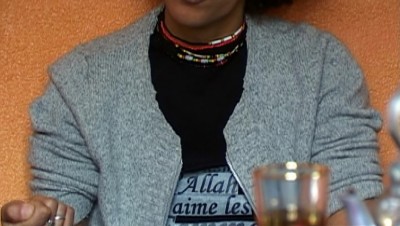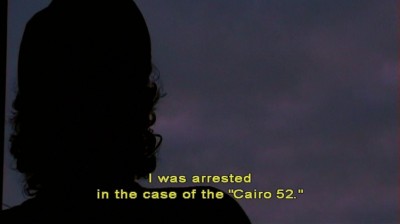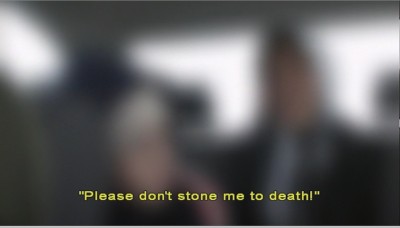| Reviews & Columns |
|
Reviews DVD TV on DVD Blu-ray 4K UHD International DVDs In Theaters Reviews by Studio Video Games Features Collector Series DVDs Easter Egg Database Interviews DVD Talk Radio Feature Articles Columns Anime Talk DVD Savant Horror DVDs The M.O.D. Squad Art House HD Talk Silent DVD
|
DVD Talk Forum |
|
|
| Resources |
|
DVD Price Search Customer Service #'s RCE Info Links |
|
Columns
|
|
|
Jihad for Love, A
Produced by Sandi Simcha DuBowski, the director of Trembling Before G-d, the 2001 documentary portrait of homosexual Orthodox Jews attempting a similar reconciliation of their homosexuality and religious devotion, A Jihad for Love is an ambitious attempt to document a diverse group of devout gay and lesbian Muslims in South Africa, Egypt, Iran, Turkey, France and India.
Interviews filmed in Egypt and Iran were done covertly because homosexual intercourse is regarded there not only as a sin, but also as a crime. However, even among the Muslims interviewed in countries legally tolerant of homosexuality such as France, South Africa, and Turkey many of the interviewees proved unwilling to show their faces. In the many interviews conducted in darkened rooms, or with cropped heads or blurred faces, it's often not clear whether they're hiding their identity for fear of consequences for relatives in fundamentalist countries, of extrajudicial violence against their person, social stigma, personal shame, or some combination thereof.
Sharma elected not to explore the issue of why his interviewees choose to stay within a religious faith that overwhelmingly regards homosexual intercourse as a crime against God deserving of death. Only one of the interviewees directly argues for a more liberal interpretation of the religious texts, asserting that when read in context the Qur'an's condemnation is actually only of homosexual rape not consensual homosexual intercourse. However, as one unsympathetic South African imam rebutted, there's near universal consensus among Islamic scholars that homosexual intercourse is a sin deserving of death, "the only difference among the jurists is how that person should be killed."

Sharma also failed to sufficiently explain that it is homosexual intercouse, not homosexuality per se that is prohibited by mainstream interpretations of the principal Islamic religious texts (in fact, several traditions within Islam regard homosexual attraction as a natural and commonplace desire from which the faithful must abstain). Thus, not only could the interviewees resolve their personal religious dilemmas by renouncing their faith, they could also do it by refraining from homosexual intercourse.
 |  |
Instead of exploring these deeper issues of personal psychology and religious dogma and following where they lead (e.g., what to make of a heretic's professed adherence to a religion while picking and choosing among its tenants), Sharma was content to focus on the dangers, stigma and small comforts found by individual gays and lesbians both within intolerant Islamic nations and within Muslim communities in liberal democratic nations. Ironically, the on camera calls for death to practicing homosexuals come predominately from those in tolerant democratic nations, most ironically from the giggling teenage daughters of an openly-gay South African imam.
 |  |
Presentation
Video:
A Jihad for Love is presented in anamorphic widescreen (1.78:1 aspect ratio). Considering that much of the footage on this modestly-budgeted documentary was surreptitiously shot, image quality is better than expected. Shot mostly with natural light, images are sometimes dark and the effects to obscure faces are frequently annoying, but color levels are otherwise generally good and detail is adequate for video sourced material.
Optional subtitles are offered in English, Arabic, Farsi, Urdu, Hindi, Turkish, French and Spanish.
Audio:
As with the video, the audio quality is better than expected given the necessity of recording surreptitiously at times. The 2.0 DD audio in mixed English, Arabic, Farsi, Urdu, Hindi, Turkish and French demonstrates little or no dynamism, but through judicious use of voiceover and direct recordings dialogue is always sufficiently clear.
Extras:
Twenty-four minutes of additional footage consisting of a director's comment, footage from a radio call-in and from the film festival circuit, and four additional scenes are also provided.
Final Thoughts:
Alas A Jihad for Love gives little consideration to the metaphysical, psychological, and religious questions of reconciling homosexual practices with devotion to Islam, but for viewers content to focus on personal stories about punishment, stigma, tolerance and community for homosexuals within Islam and the greater Muslim community, A Jihad for Love should be a mostly satisfying rental.
|
| Popular Reviews |
| Sponsored Links |
|
|
| Sponsored Links |
|
|
| Release List | Reviews | Shop | Newsletter | Forum | DVD Giveaways | Blu-Ray | Advertise |
|
Copyright 2024 DVDTalk.com All Rights Reserved. Legal Info, Privacy Policy, Terms of Use,
Manage Preferences,
Your Privacy Choices | |||||||













